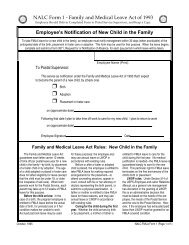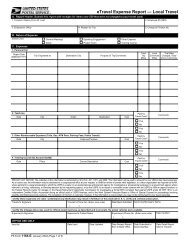Interviewing Postal Inspectors, Obtaining Their ... - NALC Branch 908
Interviewing Postal Inspectors, Obtaining Their ... - NALC Branch 908
Interviewing Postal Inspectors, Obtaining Their ... - NALC Branch 908
You also want an ePaper? Increase the reach of your titles
YUMPU automatically turns print PDFs into web optimized ePapers that Google loves.
<strong>NALC</strong> Arbitration Advocate Page 11<br />
Volume 2, Issue 2 May 1998<br />
'/'&;(14'.#;'&&,756/'065<br />
Proof of Harm Supports Advocate’s Demand for Remedies<br />
6ometimes a persuasive arbitration<br />
advocate can marshal powerful<br />
facts to help wring an unusual<br />
remedy from a relatively ordinary<br />
contract violation. That’s what<br />
happened in a recent case decided<br />
by regional Arbitrator Walter Powell,<br />
C-17771, November 15, 1997.<br />
The case arose in Lansdale,<br />
Pennsylvania, where jointly administered<br />
route inspections were completed<br />
on October 15, but despite<br />
two extensions of time, 12 of the<br />
required new routes were not established<br />
by the following January<br />
31 st . As the arbitrator stated, the<br />
facts were “largely undisputed.”<br />
Various management difficulties,<br />
rather than intentional stalling,<br />
had led to the delay. The <strong>Postal</strong><br />
Service had<br />
placed a temporary<br />
freeze on<br />
PTF promotions<br />
to full-time.<br />
Postings had to<br />
be conducted<br />
throughout the<br />
entire Philadelphia<br />
area. Transfers of carriers<br />
from other stations were delayed.<br />
New vehicles were unavailable and<br />
the old ones eventually obtained<br />
needed complete overhauls. New<br />
relay boxes had to be installed.<br />
Extreme winter weather added<br />
to these delays and also brought<br />
extra burdens to carriers who were<br />
already working overburdened<br />
routes. Some twenty-two snow and<br />
ice storms delayed the mail and<br />
made the routes particularly difficult<br />
to carry. During this period all<br />
of the carriers at the Lansdale Post<br />
Office worked maximum overtime.<br />
In arguing for a monetary remedy<br />
at arbitration, <strong>NALC</strong> needed to<br />
convince the arbitrator that overtime<br />
pay alone was insufficient to<br />
remedy the <strong>Postal</strong> Service’s failure<br />
to implement needed adjustments<br />
within 52 days, as required by Section<br />
211.3 of the M-39. And it<br />
needed to overcome the fact that<br />
management’s contract violation<br />
was not intentional or in bad faith,<br />
but rather the result of difficulties<br />
and omissions.<br />
*' #&81%#6'<br />
5*19'& 6*' *#4/<br />
&10' $; 6*' (#+.74'<br />
61 #&,756 4176'5T<br />
The union advocate succeeded<br />
by providing evidence that the affected<br />
carriers had suffered a<br />
“harm”—they had been forced to<br />
work extraordinary hours under<br />
difficult conditions. <strong>NALC</strong> offered<br />
facts showing that the carriers had<br />
suffered “bad<br />
morale, additional<br />
stress<br />
and total discomfort”<br />
as a<br />
result.<br />
The union<br />
also provided<br />
arbitration<br />
precedent establishing the power of<br />
an arbitrator to grant monetary<br />
remedies in situations not explicitly<br />
contemplated by the language of<br />
the National Agreement. National<br />
Arbitrator Gamser’s decision in C-<br />
03200 was quoted by Arbitrator<br />
Powell’s decision:<br />
To provide for an appropriate<br />
remedy for breaches of the<br />
terms of the agreement, even<br />
where no specific provision<br />
defining the nature of such remedy<br />
is to be found in the agreement,<br />
certainly is found within<br />
the inherent powers of the arbi-<br />
trator.<br />
Arbitrator Powell distinguished<br />
the case before him, in which management’s<br />
violation had resulted<br />
from omissions and failures, from<br />
the facts of this Gamser case, in<br />
which management behavior had<br />
flagrantly disregarded the contract.<br />
However, he apparently was convinced<br />
by two additional cases offered<br />
by <strong>NALC</strong>, in which arbitrators<br />
had specifically approved the<br />
granting of additional, compensatory<br />
remedies to carriers affected<br />
by a failure to adjust routes within<br />
the time limit. C-14385, Regional<br />
Arbitrator Alan Walt, April 13,<br />
1995; C-10167, Regional Arbitrator<br />
Robert Williams, August 6, 1990.<br />
Arbitrator Powell sustained<br />
the grievance even though local<br />
management had not violated the<br />
contract intentionally. He further<br />
ordered monetary remedies for all<br />
of the carriers whose routes were<br />
not timely adjusted:<br />
♦ $10.00 per day for affected carriers<br />
who had signed the overtime<br />
desired list; and<br />
♦ One hour of pay at the overtime<br />
rate per day, for carriers<br />
who had not signed the OTDL.<br />
This award shows how an advocate<br />
can use precedent and effective<br />
argument to obtain a monetary<br />
remedy even where management’s<br />
contract violation is apparently unintentional.<br />
It stands for the principle<br />
that the National Agreement<br />
empowers an arbitrator to provide<br />
a remedy where there has been a<br />
wrong.<br />
…











